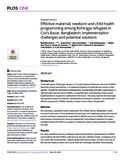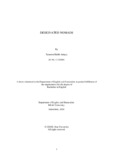Access to education for Rohingya refugee children in Bangladesh
Abstract
The thesis examines the nature of education that Rohingya refugee children accessed in Bangladesh with emphasis on the challenges the children come across in a seemingly endless humanitarian crisis. The purpose of the study was to examine the intervention by nongovernmental organizations (NGOs) as agents of change towards increase access to education especially with a focus on Friendship NGO. The data collection methods included the following: Three focus group discussions that were conducted in the Ukhia region and an interview focused on a key informant from the Friendship NGO. Although the data collection process was supposed to be conducted on site various factors such as security threats and bureaucratic procedures restricted the process, and as a result key informant interviews (KIIs) were conducted remotely. To understand the cultural background of the study community, primary data was collected through focus group discussion (FGDs) conducted by Friendship NGO staff with the parents of Rohingya children and secondary data collection for contemporaneous background information. The findings reveal that socio cultural, language and environmental characteristics of the Learners negatively affect educational interventions in the form of Curriculum developed from Myanmar based, language disparities and home schooling environment respectively. However NGOs’ intervention has remained challenging by structural factors like insufficient utilization of internet, politically instable environment, infrastructure and economic crunch which hinders realization of education for the Rohingya children. This research promotes culturally relevant programs that may address obstacles in education and identity formation among the Rohingya children, who have a bleak future ahead of them, in order to enhance the possibility of a better future for these children.
Keywords
Refugee settlement; Refugee children; Rohingya refugee; Rohingya refugee camps; Humanitarian crisis; NGOLC Subject Headings
Rohingya (Burmese people)--Bangladesh.; Refugee children--Education--Bangladesh.Description
This thesis is submitted in partial fulfillment of the requirements for the degree of Bachelor of Social Science in Anthropology, 2024.Department
Department of Economics and Social Sciences, BRAC UniversityType
ThesisCollections
Related items
Showing items related by title, author, creator and subject.
-
Effective maternal, newborn and child health programming among Rohingya refugees in Cox’s Bazar, Bangladesh: Implementation challenges and potential solutions
Sarker, Malabika; Saha, Avijit; Matin, Mowtushi; Mehjabeen, Saima; Tamim, Malika Asia; Sharkey, Alyssa B.; Kim, Minjoon; Nyankesha, Ele´vanie U.; Widiati, Yulia; Shahabuddin, A. S. M. (PLOS ONE, 2022-03-26)Background The health status of Rohingya refugees or Forcibly Displaced Myanmar Nationals (FDMNs), especially women and children, is a significant challenge for humanitarian workers in Bangladesh. Though the Government ... -
Designated Nomads
Aniqua, Tasneem Habib (Brac University, 2020-09)As a response to the refugee crisis that occurred as an aftereffect of the World War II, the United Nations Organisation had created the United Nation High Commissioner for Refugees in 1951. The 20th century has witnessed ... -
Assessment of faecal sludge management system in Rohingya response refugees camps, Ukhiya, Cox’s Bazar
Islam, Md. Toriqul (Brac University, 2024-03)Bangladesh is currently experiencing the world’s fastest increasing Rohingya refugee settlement issue. With limited resources and available space, managing feces sludge in emergency settlements with a high population ...




